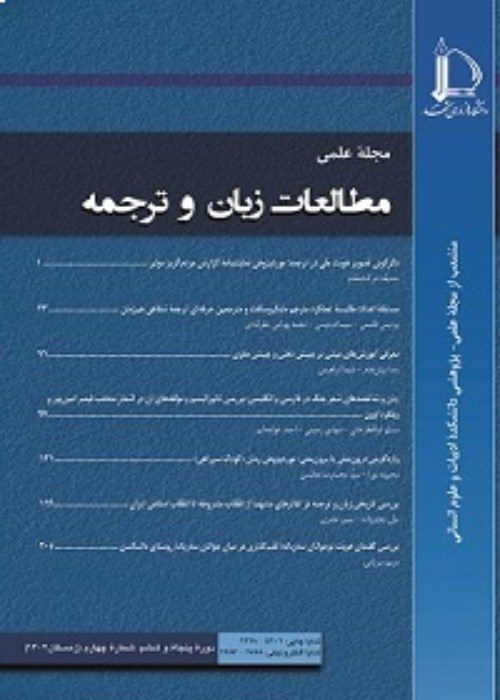Comparing the Effects of Two Types of Planning on Iranian EFL Learner's Writing Performance in Terms of Fluency, Accuracy and Complexity
Author(s):
Abstract:
Introduction
Language teachers frequently observe a gap between their student's potential competence and their performance in the class. Anderson (1993) attributes this to the fact that human has a limited processing capacity and is not able to attend to various aspects of a task simultaneously. This limitation causes L2 learners not to be able to focus on both meaning and form at the same time. As a result, they have to attend to and prioritize only one aspect of language performance (Skehan, 1996; VanPatten, 1990). To solve the problem of limited capacity, task planning has been suggested by some scholars (e.g., Ellis, 2005; Samuda, 2001; Skehan, 1996, 1998).Theoretical Framework: Newell and Simon (1972) were among the pioneers who suggested the idea of task planning. They considered planning as goal-oriented mental activity used by language users to attain pre-determined objectives. Ellis (2005) considers planning as a problem solving action which helps language users in making decision about linguistic devices. Task planning has long been assumed to influence the performance of both L1 and L2 writing. Studies in L1 writing have proven that the main difference between novice writers and expert ones is in the amount of time they spend on planning .Ellis (2005) proposes two main types of planning each of which can be further divided. The first type of planning called pre-task planning occurs before performing the main task and consists of rehearsal and strategic planning. The second type of planning that happens during the main task performance is called within-task planning which subsumes pressured and unpressured conditions. Rehearsal or repetition planning provides language users with an opportunity to accomplish the task before the main performance. This way learners can perform the task as a preparation for a following performance. However, strategic planning causes learners to be familiarized with the content and language they need during the main performance. Both pressured and unpressured planning happen during the task performance. While unpressured planning language learners have opportunity to engage in careful online planning.
On the other hand, language learners are provided with sufficient time for planning their output. Nonetheless, pressured planning does not allow any breathing space in planning while performing the task (Bui, 2014). Ellis (2005) believes pressured planning equips L2 learners with rapid planning.
Methodology
The research sample was a total of 134 Iranian university students, 32 males and 102 females, within the age range of 23 to 48.Since level of proficiency was considered as an independent variable, the participants were selected from both BA and MA Iranian EFL students to enjoy different proficiency levels .Accordingly, 76 participants whose scores were one standard deviation below the mean made up the Low Proficiency (LP) group of the study. However, 58 participants whose scores were one standard deviation above the mean made up the High Proficiency (HP) group. The participants of both HP and LP groups were given the same types of tasks and they were to write once under pre-task planning and once under online planning. During pre-task planning condition, all the participants had an opportunity to plan for the tasks prior to the task performance. They were allowed ten minutes for planning and 15 minutes to perform the task. Regarding the on-line planning condition, the participants were also given written instructions. They were given a piece of paper and told to write down the story. They were told they could take as long as they like. The participants were given no time for pre-task planning but ample time for on-line planning.Results and Discussion
To investigate the research questions both descriptive statistics and two-way ANOVA were calculated. Descriptive statistics revealed that the online group showed a higher mean on the accuracy of narrative writing than the pre-task group. Moreover, the results of two-way ANOVA indicated that there was a significant difference between the low and high proficiency groups mean scores on the accuracy of writing. The second two-way ANOVA revealed that there was a significant difference between the LP and HP groups means on the fluency of writing. The HP group outperformed the LP group. However, there was not any significant interaction between the types of treatment and proficiency levels .The third two-way ANOVA showed a significant difference between the two means in terms of complexity. The results showed no significant interaction between the types of planning and proficiency level. The findings indicated that neither pre-task planning nor online planning could improve writing performance .¬These findings of the study are in line with the findings of s Bygate(2001),Seyyedi, Orang and SharafiNejad(2013), Mochizuki and Ortega (2008), Mehrang and Rahimpour (2010), Shin (2008), and Meraji (2011).Conclusions & Suggestions: The findings of the study revealed that neither type of planning could improve writing performance. The results also showed that HP group participants outperformed LP group ones in all three aspects of accuracy, fluency and complexity .It is suggested that future studies can investigate the effects of planning on the performance of different types of styles of writing such as descriptive, narrative and expository writing. Moreover, the present study adopted Ellis'(2005) model, other investigators can adopt other models such as Robinson's (2001), Skehan's (1998) and Bui's (2014) models.
Keywords:
Accuracy , Complexity , Fluency , Planning , Task , Based Teaching
Language:
Persian
Published:
Language and Translation Studies, Volume:48 Issue: 4, 2016
Page:
117
magiran.com/p1607744
دانلود و مطالعه متن این مقاله با یکی از روشهای زیر امکان پذیر است:
اشتراک شخصی
با عضویت و پرداخت آنلاین حق اشتراک یکساله به مبلغ 1,390,000ريال میتوانید 70 عنوان مطلب دانلود کنید!
اشتراک سازمانی
به کتابخانه دانشگاه یا محل کار خود پیشنهاد کنید تا اشتراک سازمانی این پایگاه را برای دسترسی نامحدود همه کاربران به متن مطالب تهیه نمایند!
توجه!
- حق عضویت دریافتی صرف حمایت از نشریات عضو و نگهداری، تکمیل و توسعه مگیران میشود.
- پرداخت حق اشتراک و دانلود مقالات اجازه بازنشر آن در سایر رسانههای چاپی و دیجیتال را به کاربر نمیدهد.
In order to view content subscription is required
Personal subscription
Subscribe magiran.com for 70 € euros via PayPal and download 70 articles during a year.
Organization subscription
Please contact us to subscribe your university or library for unlimited access!




